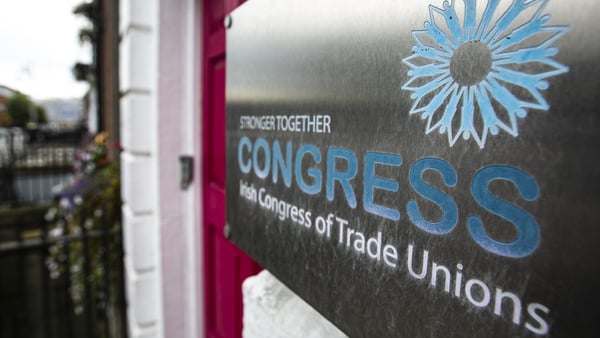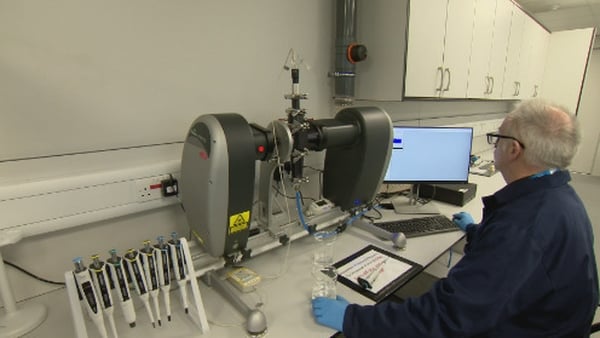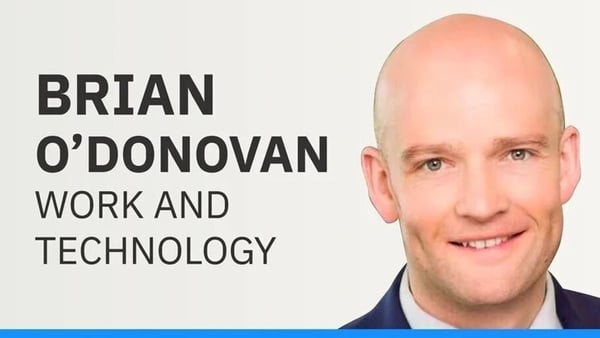Some of the biggest names in tech were standing behind US President Donald Trump at his inauguration in January.
The so-called 'tech bros' or 'broligarchy' have embraced Mr Trump, with many CEOs welcoming his anti-regulation policies.
Having received millions in donations from these billionaires, surely the US President wouldn't do anything to hurt the country's tech companies?
But these firms could well end up being caught in the crossfire of an EU-US trade war.
That is something that would have major implications for Ireland where big tech means big employment and big corporate tax receipts for the Government.
According to CSO data, around 183,000 people are employed in the information and communication sector, and many of them work for US multinational tech companies.
The 'gun on the table'
Back in 2023, the EU reached agreement on an Anti-Coercion Instrument (ACI) to enable it to take countermeasures against a non-EU country, including a wide range of restrictions related to trade, investment and funding.
It provides a means to act in situations where a country tries to interfere in the policy choices of the EU or a member state by applying or threatening to apply measures affecting trade or investment.
At the time of the agreement, the Chair of the European Parliament's Committee on International Trade Bernd Lange told reporters that "sometimes it's necessary to put a gun on the table, even knowing that it's not used day by day".

As Europe waits to see what tariffs Donald Trump will announce later today, there are growing calls for that "gun on the table" to form part of the EU response, and to use it to target Mr Trump's beloved tech companies.
"The ACI allows the European Union to suspend intellectual property rights, it allows some people to use software for free, for example licence fees on things like streaming services or software could be suspended," said Conall Mac Coille, Chief Economist at Bank of Ireland.
It had been thought that the EU would first seek to deescalate before deploying the ACI, which has been dubbed its "trade bazooka", but a recent Bloomberg report suggested that France is pushing for the measure to be used sooner.
The Financial Times reported this week that the EU is considering targeting US services exports, including the operations of American tech firms, to retaliate against tariffs.
"You might say the US administration wants protectionist measures for manufacturing, but it wants a wide open market for services exports and for tech firms," Mr Mac Coille said.
"A standoff and negotiated deal is still a distinct possibility, avoiding severe tariffs, but if there is an escalation of the EU-US trade dispute, tech firms will almost certainly be part of it, and that's a risk for Ireland," he added.
Patrick O'Donnell, Head of Technology and Growth Research at Goodbody, said retaliatory taxation measures or tariffs targeting US tech companies are a possibility.
"I believe that's one of the things that Europe has been keeping up its sleeve in terms of a defence mechanism," he said.
Semiconductor industry
Mr O'Donnell also believes tariffs could have implications for the semiconductor sector in Ireland.
"We're home to at least half of the biggest chip manufacturers in the world and I think, estimates suggest, there's about 20,000 plus high-end jobs in that sector."

"Obviously tariffs would have some implication for employment, given the impact that that would have on net demand, selling into the US, but I don't think it's as meaningful as we think as a lot of these companies are selling globally," he said.
There is a broad range of segments across the tech industry in Ireland such as social media, cyber, software services, and artificial intelligence.
"I think there is definitely parts of the sector at risk but quantifying the nature of the jobs at risk is hard to call," Mr O'Donnell said.
"With many of the big tech companies in Ireland, and a lot of what their staff are engaged in is selling on services, products, packages and solutions, and right now it doesn't look very evident that the tariffs are going to immediately impact that," he added.
Another layer of uncertainty
At the very least, concerns about tariffs and trade wars have created more uncertainty for tech companies based in Ireland.
Such nervousness usually leads to firms pausing expansion plans.
"There could be new investment impacts," said Mr O’Donnell.
"Right now, if you're an outside investor, either thinking about taking over a local, private Irish tech company, or looking to set up new operations here, I think that's increasingly difficult, given the uncertainty that the Trump administration is creating with its tariff plans."
"I think that investment point is the one I'd be most worried about at the moment," he added.
Technology Ireland, the Ibec group representing the technology sector, said that the potential imposition of US tariffs introduces a further layer of complexity to an already intricate landscape.
"While Ireland has consistently proven to be a reliable and attractive base for global technology firms, ongoing uncertainty, particularly around EU regulatory frameworks, continues to present challenges to long-term investment planning," Technology Ireland said in a statement.
"The precise implications for the tech sector remain difficult to predict right now," it added.
Una Fitzpatrick, Director of Technology Ireland, said it is worth emphasising that Ireland has been consistently advantageous for the tech sector because of its skilled workforce, research and development supports and strategic position within the EU.
"These factors have made Ireland an attractive gateway for global tech firms seeking access to the European market, and have helped foster a thriving ecosystem of innovation, investment, and employment," Ms Fitzpatrick said.
"While current uncertainties persist, Ireland's long-standing strengths are well understood by the decision makers within the tech sector," she added.
EU Regulation
The Technology Ireland statement points to uncertainty around "EU regulatory frameworks". This is an issue that has been repeatedly referenced by big tech firms like Facebook parent Meta.
In January, its CEO Mark Zuckerberg posted a video message in which he criticised EU regulations.
"Europe has an ever-increasing number of laws institutionalising censorship and making it difficult to build anything innovative there," he said.
"We're going to work with President Trump to push back on governments around the world that are going after American companies and pushing to censor more," he added.

Last year, Meta said it was withholding the roll out of certain AI models in the EU over what it described as the "unpredictable nature" of the European regulatory environment.
It also paused plans to use personal data to train AI models after concerns were raised by the Irish Data Protection Commission.
Earlier this month, Meta announced the European launch of some AI features on Facebook, Instagram, WhatsApp and Messenger.
"It's taken longer than we would have liked to get our AI technology into the hands of people in Europe as we continue to navigate its complex regulatory system - but we’re glad we’re finally here," Meta said at the time.
Mr Trump has also criticised Europe's regulation of big tech. In his recent Oval Office meeting with the Taoiseach, the US President said the Apple tax case "wasn't a good lawsuit" and added that the US "has a problem with the EU".
"Oh Apple’s been treated very badly," he said, claiming that the EU has "gone after our companies".
Micheál Martin pointed out that Ireland had fought with Apple throughout the case.
The US President has made no secret of the fact that he doesn't like the EU and that he feels it has mistreated US tech companies.
If technology firms are dragged into a transatlantic trade war, expect a lot more criticism from the White House of Europe's tech regulators.
It is criticism that could land close to home, with some of the biggest US firms policed by Irish watchdogs such as the Data Protection Commission and Coimisiún na Meán.
TikTok ban

The intertwining of tariffs and tech came into sharp focus this week when Mr Trump said he would consider a reduction in tariffs on China if the Chinese government approved a sale of TikTok’s operations in the US.
He also said he would be willing to extend a 5 April deadline for a buyer of the platform to be found.
"With respect to TikTok, and China is going to have to play a role in that, possibly in the form of an approval, maybe, and I think they'll do that," the president told reporters on Wednesday.
"Maybe I'll give them a little reduction in tariffs or something to get it done," he added.
After taking office, Mr Trump gave TikTok a 75-day reprieve by signing an executive order that delayed enforcement of a law banning the video-sharing app in the US.
He has previously tried to use tariffs as leverage in the negotiations. On his first week back in office he threatened China with further tariffs if it did not approve a TikTok sale.
Much of the concern around tariffs has focused on cars, metals and pharmaceuticals, with few direct threats to the IT sector.
But an effective retaliation by the EU may well involve targeting the "tech bros" that stood alongside Donald Trump on Inauguration Day and helped finance his return to office.
In the tit-for-tat world of trade wars, deploying that "gun on the table" or "trade bazooka" could place the tech sector firmly in the crosshairs.





